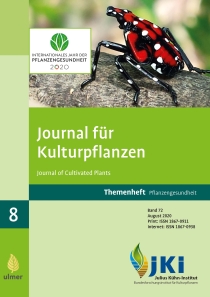Phytosanitary early alert system and information for research and breeding organisations and the public
DOI:
https://doi.org/10.5073/JfK.2020.08.06Keywords:
plant health, EU plant health regulation, quarantine pests, early alert system, notification requirement, interceptions, EUROPHYT, exceptional rules for research and breeding, quarantine stations, passenger controls, internet trade, public relations, IMSOC, TRACESAbstract
It is important to react quickly if quarantine pests and new pests are introduced into the EU to enable successful eradication measures. The new EU plant health regime therefore strengthens the early alert system where Member States inform each other about harmful organisms in imported consignments and about outbreaks of quarantine pests. The warnings are forwarded via EU-wide IT-systems set up for this purpose (EUROPHYT and TRACES). Harmful organisms are found in consignments during import controls. The outbreaks of harmful organisms are either found by official monitoring and inspections or operators and private persons notify the outbreak to the plant protection service, which is an obligation.
The new EU plant health regulation specifies improved information of the public. Especially traveller and clients of postal services and internet trade must be informed so that they avoid the introduction of harmful organisms with plants and plant products by complying with the phytosanitary regulations.
There are exceptions from phytosanitary requirements and prohibitions for official testing, scientific or educational purposes, trials, varietal selections, or breeding. Work with quarantine material is only allowed in officially nominated quarantine stations and confinement facilities. Every authorisation for import, movement, holding or multiplication of quarantine material is temporary and underlies specific requirements. The release of plants from quarantine is possible for instance for breeding material if no quarantine pests can be released with it.
Downloads
Published
Issue
Section
License
The content of the journal is licensed under the Creative Commons Attribution 4.0 License. Any user is free to share and adapt (remix, transform, build upon) the content as long as the original publication is attributed (authors, title, year, journal, issue, pages).
The copyright of the published work remains with the authors. The authors grant the Journal of Cultivated Plants, the Julius Kühn-Institut and the OpenAgrar repository the non-exclusive right to distribute and exploit the work.







